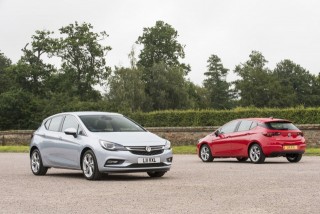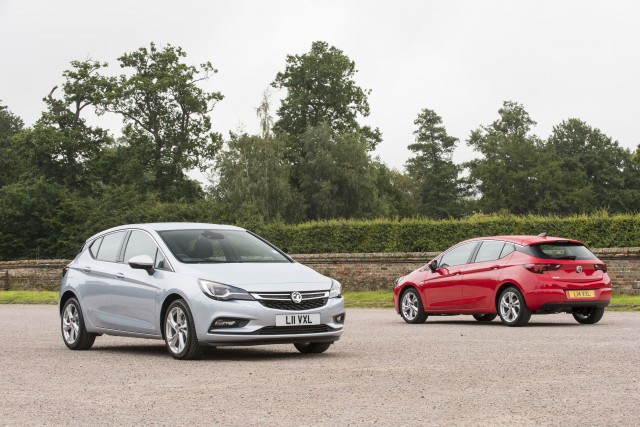 The more-for-less new Vauxhall Astra series is coming.
The more-for-less new Vauxhall Astra series is coming.
The latest seventh-generation hatchback and sports-tourer line up includes new cleaner engines in lighter and roomier bodies, more safety and convenience technology, and a slimmer range at lower prices than the models they supercede.
Like the current cars, new Astra will be built at Ellesmere Port, Cheshire after a £140M investment which will safeguard 2,000 jobs for ten years and see £70M going to UK suppliers with another 800 people making parts of the new cars. After building Vauxhall’s small car ranges for over 50 years, Ellesmere will build annually 120,000 or 680 Astra cars daily and export 52% to 25 countries, including Opel badged Astras for the first time.
Three million Astras have been bought in Britain in 36 years and account for one-in-eight C-Segment cars on our roads. New Astra debuts at the Frankfurt Motor Show this month and first hatchback models are in showrooms in October with the ST versions coming early next year.
Careful design by a team led by Brits Mark Adams and Malcom Ward and latest steel technology has cut body shell weight by 20% while overall the new Astra is up to 200KG lighter, including shaving kilogrammes from the axles.
Astra is the first Vauxhall to get OnStar, a comprehensive 24/7 back up and customer assistance service based at Luton to serve Europe and eventually employ about 200 multi-lingual staff.
 OnStar effectively turns the vehicle into a WiFi 4G mobile hotspot providing real-time service and other advice, emergency aid and the ability to stop the car if reported stolen. Users get Apple CarPlay and Android Auto to provide Intellilink infotainment.
OnStar effectively turns the vehicle into a WiFi 4G mobile hotspot providing real-time service and other advice, emergency aid and the ability to stop the car if reported stolen. Users get Apple CarPlay and Android Auto to provide Intellilink infotainment.
Drivers can also specify for about £1,500 the newest “intelligent” LED headlights which use a camera and other sensors to read the road and automatically adjust beams to prevent dazzle.
Powertrains use five or six-speed manual gearboxes or a six-speed automatic mated to a choice of petrol and diesel engines from 105PS 3-cyl 1.0 litre to new aluminium 100, 125 and 150PS 4cyl 1.4, and 200PS 1.6 petrol units or the updated 1.6 litre whisper-diesel in 110, 136 or 160PS versions.
There are Design, Tech Line, Energy, SRi, SRi Nav, Elite and Elite Nav trim levels from under £15,300 on the road. Vauxhall believe the SRi will be the most popular with diesels slightly outselling petrol models among fleet buyers but petrol versions will dominate retail sales.
Slightly smaller than the outgoing model, new Astra is roomier inside, particularly for rear seat passengers and the boot remains from 370 to 1210 litres to satisfy business drivers. ST versions are similarly bigger inside than the previous models.
FIRST IMPRESSIONS
We were able to briefly drive 1.0, new 1.4 and 1.6 diesel models over a mixture of rural, main and motorway roads and immediately noticed how much quieter and better riding they were than the sixth generation Astras.
Perhaps the most impressive was the entry level 1.0 engine which did a sterling job in light traffic and easily kept the motorway limit without feeling desperately slow when accelerating and we saw economy in the mid-40s. Our longer spell in the 150 1.4T showed this return 42.5mpg overall with a firmer ride than the 1.0 version but it was still refined and had good gearchange with low noise levels from powertrain, road or wind sources. The anticipated best selling 136 1.6 CDTI was more flexible and this showed in our consumption of 53.5mpg, with good pulling power for overtaking and very composed character on main roads but there was little feedback from the steering or brakes. We liked the additional room for those in the back and the way the driving position could be tailored to taste along with the wide opening hatch and low sill to load big items.
 A night-drive in the Astra to try out the new IntelliLux LED Matrix headlights was inconclusive. You have to push a column button to select the Auto-mode and they are bright and have a wide beam as they are effectively on full beam at all times until the camera senses a vehicle ahead or street lighting. Then parts of the headlight ‘dip’ to reduce dazzle or blinding cars infront and they look around corners to a degree as well.
A night-drive in the Astra to try out the new IntelliLux LED Matrix headlights was inconclusive. You have to push a column button to select the Auto-mode and they are bright and have a wide beam as they are effectively on full beam at all times until the camera senses a vehicle ahead or street lighting. Then parts of the headlight ‘dip’ to reduce dazzle or blinding cars infront and they look around corners to a degree as well.
But we and colleagues found the headlights’ response times were slow and the units seemed confused by the amount of ambient lighting and reflections from white lines and they really only worked as expected in unlit country lanes.
Fast facts:
Model: Vauxhall Astra SRI Nav 1.6CDTI (anticipated best seller)
Price: £21,480 (£23,465 with Matrix lights, parking pack and electronic climate control)
Mechanical: 4cyl 136PS 1598cc turbo-diesel, 6sp manual
Max Speed: 127mph
0-60mph: 9secs
Combined MPG: 53.5mpg on test
Insurance Group: 16E
C02 emissions: 103gkm
Bik rating: 18%
Dimensions: L 4.37m; W 2.05m; H 1.49
Boot space: 370 – 1210 litres
Kerb weight: 1350KG
Warranty: 3yrs/ 60,000miles
For: Powertrain response and flexibility, economy, roomy, good ride and safe handling with low noise levels throughout
Against: Some dullness to steering and brakes, rear visibility, questionable expense of Matrix headlights.
Images by Dave Smith


